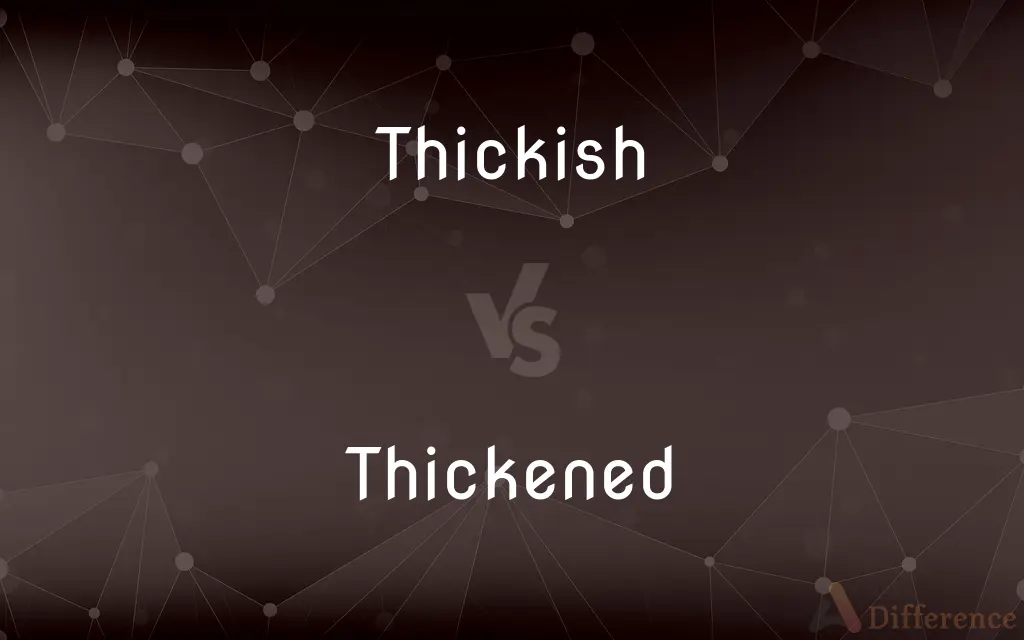Thickish vs. Thickened — What's the Difference?
By Tayyaba Rehman — Published on October 22, 2023
Thickish implies somewhat thick, not fully; Thickened denotes the process or state of becoming denser or more viscous.

Difference Between Thickish and Thickened
Table of Contents
ADVERTISEMENT
Key Differences
Thickish and Thickened are terms with different implications and applications. Thickish denotes a characteristic that is somewhat thick but not fully or solidly so. It represents an intermediate state of thickness, indicating that something is neither thin nor completely thick, usually implying a natural state or inherent quality. In contrast, Thickened refers to something that has undergone a process to become denser or more viscous. It implies an alteration from an original state, usually through external intervention or a change in conditions.
In everyday language, thickish is often used to describe objects, substances, or qualities that exhibit a degree of thickness but do not fully embody the characteristic of being thick. It’s a term that finds utility in casual, informal expressions to convey approximate states or inherent properties of items, implying an inherent or natural condition. On the other hand, thickened is commonly utilized to express the outcome of a process, where substances or materials have increased in density or viscosity, emphasizing the aspect of change or transformation from an original state.
The expression ‘thickish’ might be used to convey the non-extreme, inherent quality of items, portraying them as neither too thick nor too thin. It emphasizes the natural or original state of objects or substances, allowing for a nuanced expression of their characteristics. Whereas ‘thickened’ articulates the altered state of objects or substances, focusing on the transformation they have undergone to become more dense or viscous. It underscores the aspect of modification or transition, highlighting the resultant condition as opposed to the original state.
In communicative contexts, the nuanced distinction between thickish and thickened allows for a richer, more precise conveyance of meaning. ‘Thickish’ offers a convenient means to describe inherent qualities in a non-extreme, approximate manner, providing a balanced representation of characteristics. Conversely, ‘thickened’ delivers a clear depiction of altered states, focusing on the outcome of processes or changes, enabling a concise expression of transformation and resultancy in various contexts.
Comparison Chart
Definition
Refers to something that is somewhat but not fully thick.
Refers to something that has become denser or more viscous.
ADVERTISEMENT
Application
Used to describe inherent or natural state.
Used to depict alteration or the result of a process.
Implication
Implies an intermediate state of thickness.
Implies an altered state from the original condition.
Expression of State
Represents a non-extreme, inherent quality of being somewhat thick.
Represents an altered, resultant condition of increased density or viscosity.
Usage
Utilized in casual, informal expressions to convey approximate states.
Commonly employed to express the outcome of a change or transformation.
Compare with Definitions
Thickish
Thickish implies a degree of thickness but not solidly so.
He spread a thickish layer of butter on his toast.
Thickened
Thickened denotes the result of a process or change.
With the addition of flour, the soup thickened nicely.
Thickish
Thickish is used to convey the non-extreme, inherent quality of items.
He wore a thickish coat to ward off the chill.
Thickened
Thickened implies that something has become more dense or viscous.
The sauce thickened as it simmered on the stove.
Thickish
Thickish provides a nuanced expression of non-extreme characteristics.
The sauce had a thickish consistency, perfect for dipping.
Thickened
Thickened represents an altered state from the original condition.
The plot thickened as new evidence was discovered.
Thickish
Thickish refers to being somewhat thick.
The fog was thickish, reducing the visibility on the road.
Thickened
Thickened highlights the transformation undergone by substances or materials.
As the temperature dropped, the liquid thickened into a gel.
Thickish
Thickish denotes an intermediate state of thickness.
The book had thickish pages, making it appear larger.
Thickened
Thickened emphasizes the resultant condition as opposed to the original state.
His voice thickened with emotion as he spoke about his experiences.
Thickish
Relatively great in extent from one surface to the opposite, usually in the smallest solid dimension; not thin
A thick board.
Thickened
To make or become thick or thicker
Thicken the sauce with cornstarch. The crowd thickened near the doorway.
Thickish
Measuring a specified number of units in this dimension
Two inches thick.
Thickened
To make or become more intense, intricate, or complex
The leader's departure thickens the problems. Our apprehension thickened.
Thickish
Heavy in form, build, or stature; thickset
A thick neck.
Thickened
Simple past tense and past participle of thicken
Thickish
Having component parts in a close, crowded state or arrangement; dense
A thick forest.
Thickened
Made or having become thick;
Thickened bronchial arteries
Thickish
Having or suggesting a heavy or viscous consistency
Thick tomato sauce.
Thickened
Having skin made tough and thick through wear
Thickish
Having a great number; abounding
A room thick with flies.
Thickened
Made thick in consistency;
Flour-thickened gravy
Dust-thickened saliva
Thickish
Impenetrable by the eyes
A thick fog.
Thickish
Hard to hear or understand, as from being husky or slurred
Thick speech.
Thickish
Very noticeable; pronounced
Has a thick accent.
Thickish
(Informal) Lacking mental agility; stupid.
Thickish
(Informal) Very friendly; intimate
Thick friends.
Thickish
(Informal) Going beyond what is tolerable; excessive.
Thickish
In a thick manner; deeply or heavily
Seashells lay thick on the beach.
Thickish
In a close, compact state or arrangement; densely
Dozens of braids hung thick from the back of her head.
Thickish
So as to be thick; thickly
Slice the bread thick for the best French toast.
Thickish
The thickest part.
Thickish
The most active or intense part
In the thick of the fighting.
Thickish
Somewhat thick.
Thickish
Somewhat thick.
Common Curiosities
Does thickish refer to something somewhat but not fully thick?
Yes, thickish denotes something that is somewhat thick but not solidly so.
Does thickened represent something that has become denser or more viscous?
Absolutely, thickened refers to the state of having increased in density or viscosity.
Can thickish be used to describe the inherent or natural state of objects or substances?
Yes, thickish is often used to describe the natural or inherent state of objects or substances.
Share Your Discovery

Previous Comparison
Miracle vs. Wonder
Next Comparison
Sunflower Oil vs. Soybean OilAuthor Spotlight
Written by
Tayyaba RehmanTayyaba Rehman is a distinguished writer, currently serving as a primary contributor to askdifference.com. As a researcher in semantics and etymology, Tayyaba's passion for the complexity of languages and their distinctions has found a perfect home on the platform. Tayyaba delves into the intricacies of language, distinguishing between commonly confused words and phrases, thereby providing clarity for readers worldwide.
















































